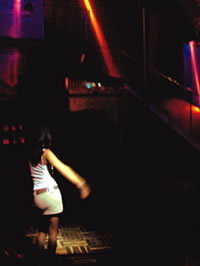I woke up in the morning, finding a flyer slipped under my apartment door. Beijing,the year is 2004, and the flyer is an advert on some new plastic surgery clinic. That is one of many ways you can greet the day here, the modern capital of the Middle Kingdom. Contemporary Beijingers seem to be obsessed with their looks – plastic surgery clinics mushrooming, penetrating even your private space.
Spas lifestyle finally arrived in this part of the world. On the streets, promo girls push the flyers in your palms. This year alone, China hosted four miss pageant contests, including the Miss World. They will start another one soon, and this will be dedicated to those who went through a plastic surgery. As absurd as it might sound, the latest contest was triggered by a girl who was disqualified in one of previous contests because the jury found out her surgically altered face. She fought back – oddly enough leading to her chance to finally win in the next new contest. Another month witnessed a conference on lingerie productions, including a fashion show of the next season.
Body is now the temple of many Beijingers. This theme moved Wen Hui, a choreographer, staged Report on the Body, a performance by Living Dance Studio, the first independent dance company in China. The troupe had been in Europe for the second round. “I’m amazed with this change. You can find bathhouses or spas almost in every corner. Manicure-pedicure, branded clothes, expensive cosmetics. What’s this all about?” mused Wen Hui. This seemingly newfound bodily obsession is transferred to the stage – unfortunately only had one chance to be performed in front of public in Beijing back in end of 2002, but ironically has been touring throughout several cities in Europe ever since.
Beijing too, the city, can be seen as a ‘body’- constantly undergoing a makeover. This once ancient, imperial capital, has gone through a massive, rapid change in the past few years. Built as if imitating a fortress, with four ring roads circling and bordering, Beijing is so vast and so spread out a space. Construction sites are ubiquitous: apartments, malls, and the so-labelled, ‘New CBD’ – Central Business District. A passionate taxi driver took me to a little tour, a quick glance to his favourite, lovely fangzi (ordinary, traditional Chinese house in the hutong/alleyway area). He has been living for decades in one himself, he said, and he despairs to notice its continuous, alarming disappearance. Experts predict that at least 600 hutong are disappearing every year now, replaced by what the policy makers have in mind.
Now, I find, one of the most delightful things to do in Beijing is to stroll down its old, most ordinary hutong and sample the arguably most charming slice of life of the city. The kind around Jishuitan area (not so far from the lake side where glitzy, night life spot Hou Hai is). It is where life evolves around a few simple things – originally-built fangzi and most still with no toilets (that is why public toilets became a truly Beijing features), small eateries lining up side by side with ‘fake’ barber shops (where girls in blonde-dyed hair waiting for ‘customers’). All in harmony. It’s as if an arena to show what Chinese used to be very good at - the Taoist art of loafing - where guys playing mahjong on the street side, eating spicy meat stick for half cent per piece at a cheap food stall, drinking a bottle of Yanjing beer for only RMB 2 (around Rp 2200). It’s where you can nick delicious mala tang - Sichuan food assortments dipped in yummy sauce, all only RMB 3. The bonus is to get a genuine hospitality from the owners instead of a brisk, baffled fuwuyuan (waiters/ress) at the bigger restaurants. Living is cheap, yet so rich.
Oh, for sure, you also can have a much nicer ‘hutong’-like environment – a line up of newly, stylised-built siheyuan (courtyard house) like the ones right next to the Forbidden City. Re-designed in greyish bricks, these two-story houses are really a bargain compared to those flashy, overpriced, modern apartment. Something in between is the kind around the Central Academy of Drama – a mixture of local feeling (with its surviving moongate and ‘double happiness’ sign on the door on some of its houses), but with trendy cafes and bars classily lurking.
A throughout makeover is indeed on call. Much hassle goes to the deadline of hosting the 2008 Olympics, but other reasons abound to co-exist. The 20 year or so ‘new economy’ put Beijing on the rat race to establish ‘one country two system’ or simply to set the mood of ‘capitalism with a socialist character’ off the ground. It is in a way a snowball of Deng Xiao Ping’s famous cat’s allegory back in the 1970s that ‘it doesn’t matter whether the cat is white or black as long as it catches a mouse’.
Deng, the architect of reform, whose centenary is widely celebrated this year in China, set the credo: ‘to be rich is glorious’. Surviving the odds of Cultural Revolution, China came out perplexed in the 1980s, catching the wind of change in the odder 1990s, now riding the new Millennium full gear of high optimism. It often feels like a déjà vu of being in Southeast Asian during its much-hyped ‘New Asian Tigers’ period in the late 1980s, only in a much more zapping, dizzying pace. Economic growth has been persistently around 7%, and experts raised a pro-contra on overheated issue. Do not rush to quick conclusion though. Many things change, even speed up post joining the WTO, but not as deep as it may look.
Although the China government has just issued a green card procedure for foreigners last August, it was not until 2003 when foreigners were allowed to live in any accommodation (previously confined to certain area and apartment). Export permit for private companies was just recently issued. And the restriction on international publishing will not be lifted until next year (so don’t expect you will find a wide range of English books or magazines for a city as big as Beijing). Some news sites are banned on the net (funny, you can’t log into Time International or Time Asia, but try Time Canada. Voila). And although now MBA students can apply the MacDonald index in their case studies – where you measure people’s buying power against the price of Big Mac price - it does not mean the quality of service in general is predictable or standardized as one can expect in global consumerism. In many cases, the idea of serving ‘customers’ is still a vague one, in contrast to the big campaign of consumption endorsed by the marketing gurus.
On the surface, Beijing seems like any other capital in Asia – vibrant, lively, ‘renao’ (in Chinese). Whilst it preserves the traces of history – temples, palaces, antique tombs – it invents new spots: infamous Sanlitun bar street, idyllic night life at Hou Hai, stylish eateries at Nuren Jie, underground gigs, filmmakers cafes, club life or funky shopping centre at Xidan. It is not as savvy and natural as Shanghai in tapping the global lifestyle; although the coffee cultures finally hit the city of tea houses, it still takes you miles to find a decent one. But scratch the surface, you will likely to find the true soul of contemporary China at its heart.
Compared to Shanghai superficial arts scene, for instance, – where money is the main currency - Beijing offers a genuine dynamic reflected on its range of expressions, practice and level of sophistication. Good and bad, gem and trash arts – all up for grabs. It is hard to imagine a phenomenon like Dashanzi Art District – an ex Bauhaus style factory complex, built by the East Germans in 1950s - happens in Shanghai. Two years ago, it was just a run down area, ready to be demolished. Some artists moved in, in no time it turned to a seemingly organic, trendy complex of art galleries, studio space, cool cafes, restaurants, bars, clubs and boutiques. Now, it’s on the arts world’s map – the rumour of its discontinuation as the contract of many venues will end next year, became the headline of New York Times arts page. Last year, they persisted to organise its first international arts festival, despite the absence of government permit, thus toning down the Opening bash as an act of compromise.
Indeed, this is the moving, beguiling time to be in Beijing. In a quick glance, Shanghainese may be more fluent in English and business, more natural embracing the cosmopolitan culture – now lobbying to build a special between-two-cities ties with London. Guangzhou-ren may be more pursuant of new ideas, but Beijing sets the parameter of progress, where the next wind of change breezes. No doubt, this goes beyond the city’s old charm as a merely site of imperial or socialism memorabilia.
*) this article was published in The Jakara Post, January 2005, but with minor edited words and title rephrased. Here is my original version.






